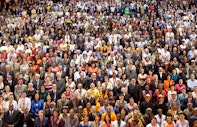What Bahá’ís Believe
Essential Relationships
One Human Family
Uniting Humanity
- What Bahá’ís Believe
- Overview
- Bahá’u’lláh and His Covenant
- The Life of the Spirit
- God and His Creation
- Essential Relationships
- Universal Peace
- What Bahá’ís Do
The conviction that we belong to one human family is at the heart of the Bahá’í Faith. The principle of the oneness of humankind is “the pivot round which all the teachings of Bahá’u’lláh revolve”.Shoghi Effendi, The World Order of Bahá’u’lláh
Bahá’u’lláh compared the world of humanity to the human body. Within this organism, millions of cells, diverse in form and function, play their part in maintaining a healthy system. The principle that governs the functioning of the body is cooperation. Its various parts do not compete for resources; rather, each cell, from its inception, is linked to a continuous process of giving and receiving.
Every individual is a member of the body of humanity. Each is essentially noble, possessing a unique soul. All have a common purpose—to carry forward an ever-advancing material and spiritual civilization. All are the citizens and co-stewards of one planet, entitled to enjoy the benefits of such a civilization. If one member of the body is in anguish or distress, all the other members must necessarily suffer. This growing awareness of our common heritage and interdependent future is redefining our understanding of ourselves and challenges the ways of contemporary society. It rejects the adversarial practices of partisan politics, the competitive spirit dominating economic activity, and the countless other situations in which conflict is accepted as the driving force of human interaction.
The emergence in diverse settings of communities guided by values of cooperation and reciprocity serves to challenge notions that human nature is essentially selfish, competitive, and driven by material consideration. Rather, we have the capacity to act out of “great unselfish love for humanity”‘Abdu’l-Bahá, Paris Talks and can operate like “the fingers of one hand, the members of one body.”Bahá’u’lláh, The Kitáb-i-Aqdas:The Most Holy Book
The oneness of humanity, however, does not imply uniformity. Rather, the Bahá’í writings affirm the principle of unity in diversity. More than the mere tolerance of differences or celebration of superficial aspects of diverse cultures, the diversity of the human family should be the cause of abiding love and harmony, “as it is in music where many different notes blend together in the making of a perfect chord.”‘Abdu’l-Bahá, Paris Talks
The human family—in all its variety—may be likened to the diverse flowers of one garden. Though these flowers may vary in colour and shape, they are all “refreshed by the waters of one spring, revived by the breath of one wind, invigorated by the rays of one sun…”‘Abdu’l-Bahá, Tablets of the Divine Plan Humanity can overcome the differences that divide it, said ‘Abdu’l-Bahá, “assisted by the collective and divine center which is the law of God and the reality of His Manifestation….”‘Abdu’l-Bahá, The Promulgation of Universal Peace
“From this same God all creation sprang into existence, and He is the one goal, towards which everything in nature yearns.”‘Abdu’l-Bahá, Paris Talks







